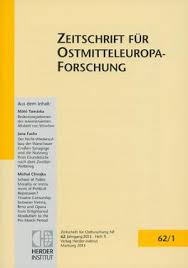Prometheismus und Osteuropaforschung in der Zweiten Polnischen Republik
Prometheanism and Eastern European Studies in the Second Polish Republic
Author(s): Ralph SchattkowskySubject(s): Political history, Social history, Interwar Period (1920 - 1939)
Published by: Verlag Herder-Institut
Keywords: Prometheanism; Eastern European Studies; Second Polish Republic;
Summary/Abstract: The acute awareness of the existence of two powerful neighbours is not only of exceptional influence for Polish society, it has significantly influenced modern Polish state formation and has been a decisive factor in Polish foreign policy. An intensive preoccupation with Germany and Russia was an integral part of political and intellectual life in the Second Polish Republic, which also found an expression in the establishment of a vibrant scholarly discussion. Especially in its institutionalised forms, this scholarship showed from the very start its close ties with the state and certain political groups. The Eastern European Studies has focused since the mid-1920s on the one hand on the study of historical Polish eastern territories (Kresy) with a clear view to the Ukraine, on the other hand on the study of the Soviet system and the peoples of the Soviet Union. The Eastern Europe Institute in Warsaw, and the Research Institute for Eastern Europe in Vilnius emerged as centres for this kind of research. In the 1930s, Vilnius became a centre for Sovietology. The political doctrine of Prometheanism proved to be a crucial driving force in interwar East European Studies. This “ideology of salvation” was aimed at supporting national movements and autonomy aspirations among the peoples of the Soviet Union and at winning them as partners in the Polish conflict with its eastern neighbour. There emerged not only a tremendous need for information about events in the east, which for the most part formed the material basis for research, Prometheanism demanded from the research institutes that they provide policy advice and held them to promote practical solutions. Polish East European Studies remained, despite its significant achievements, limited in its international efficacy, but it proved in terms of methodology and results, extraordinarily innovative, shedding light on the role Poland played as a centre of scholarship in the interwar period.
Journal: Zeitschrift für Ostmitteleuropa-Forschung
- Issue Year: 61/2012
- Issue No: 4
- Page Range: 519-565
- Page Count: 47
- Language: German

